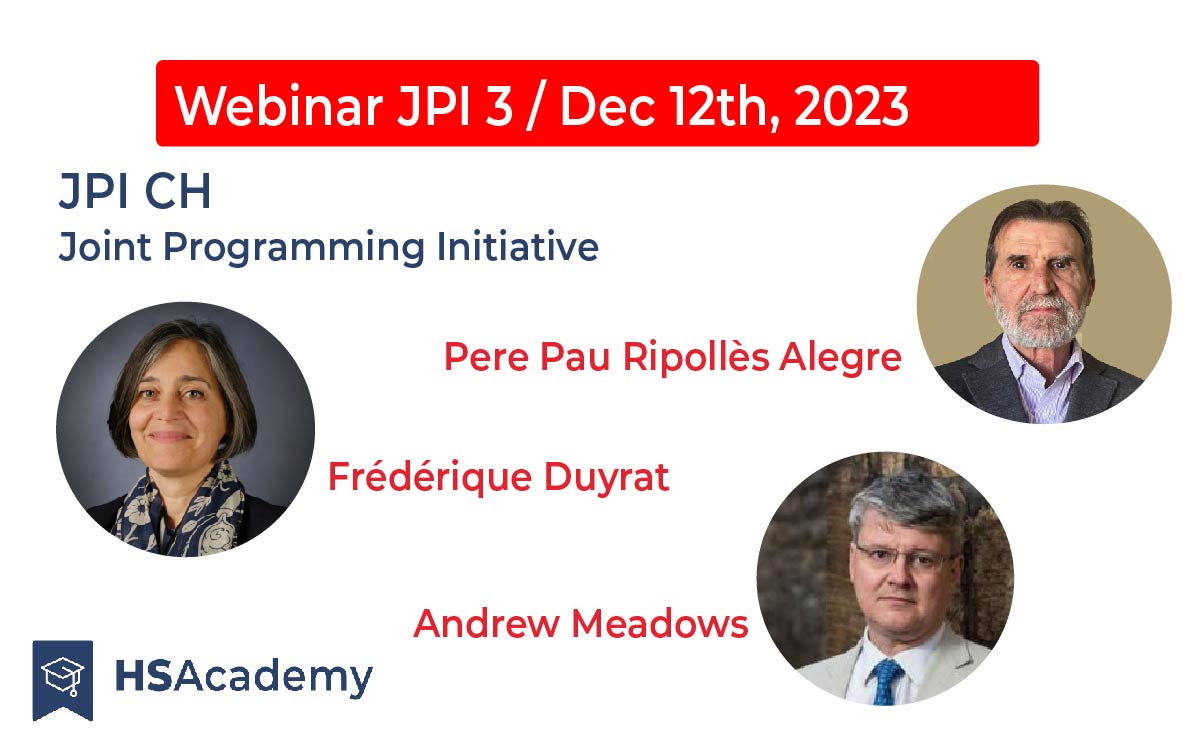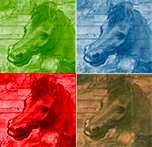
Webinar JPI CH 3: organized jointly by E-RIHS HS Academy and JPI CH
E-RIHS Heritage Science Academy Series of Webinars highlighting JPI CH-Funded Projects: three webinars to be held monthly in the last trimester 2023!
The 3rd webinar of the series, organized by HS Academy in collaboration with the Joint Programming Initiative on Cultural Heritage and Global Change (JPI CH), will be held online on December 12th, 2023 at 3 pm (CET) using the ZOOM webinar platform. The last of the special series webinars will be dedicated to the JPI CH funded project ARCH (Ancient Coinage as Related Cultural Heritage), which is a collaborative project between CSAD at the University of Oxford, the Bibliothèque nationale de France (BnF) in Paris and the Department of Archaeology at the University of Valencia, to create an online portal for Greek coinage. This project will establish, for the first time, an overarching platform for the study, curation, archiving and preservation of the monetary heritage of the pre-Roman world. Using the newly developed nomisma.org knowledge organisation system, ARCH will build a unified portal across multiple online typological resources currently under development, as well as designing a skeleton typology for the whole of the remainder of Greek coinage.
The ARCH project uses Linked Open Data technology and the standards of the nomisma.org project to establish an overarching portal for the study, curation, archiving and preservation of the monetary heritage of the ancient world – the Greek oikoumene. It offers a high-level overview of all the coin types traditionally subsumed within the discipline of ‘Greek’ numismatics, from the 7th to the 1st century BC.
Principal investigators: Dr. Frédérique Duyrat (Paris); Prof. Andrew Meadows (Oxford); Prof. Pere Pau Ripollès (Valencia) will present the ARCH project.
Date
December 12th, at 3 pm (CET)
Duration
About the speakers
The project will be presented jointly by three speakers: principal investigators of the Consortium.
- Dr.Frédérique Duyrat, Director of Collections of the Ashmolean Museum and Keeper of the Heberden Coin Room. Qualifications : MA PhD Habilitation (Sorbonne University, Paris). Frédérique Duyrat studied at Sorbonne University in Paris for her undergraduate and graduate degrees. She graduated with an MA in 1996, then spent two years at the French Archaeological Institute in Damascus where she wrote a PhD on Aradus, the most northern Phoenician city, during the Hellenistic period. She took her PhD in 2000 at Sorbonne University, and then was awarded a habilitation by the same university in 2010 for her work Wealth and Warfare. The Archaeology of Money in Ancient Syria. She taught Ancient History at Sorbonne University, then at the University of Orléans where she was also a member of the Institut de recherche sur les archéomatériaux – Centre Ernest-Babelon (CNRS), a laboratory specialized in elemental analyses of the metal of coins (2002-2013). In 2010, she was appointed curator of Greek coins in the department of Coins, Medals, and Antiques of the Bibliothèque nationale de France, before taking the position of director of this department in September 2013. She was appointed to her current post at the University of Oxford in September 2023. At the same time, she is the Director of Studies in the Monetary History of the Greek World (7th-1st century BC) at the Ecole Pratique des Hautes Etudes in Paris.
- Prof. Andrew Meadows, Director of the CSAD, PI CHANGE, his main areas of research are in the epigraphy and numismatics of the Hellenistic East, with a particular interest in the Ptolemaic empire. In 2010 I co-founded the nomisma.org project, which has pioneered the introduction of Linked Open Data approaches to ancient numismatics. In subsequent years I have managed and championed a number of the standard resources now available in digital ancient numismatics, including Online Coins of the Roman Empire. He is a historian of the Hellenistic World, a Fellow of New College and Honorary Curator at the Ashmolean Museum. Before arriving in Oxford, he was Curator of Greek Coins at the British Museum (1995-2007) and Deputy Director of the American Numismatic Society in New York (2007-2014). He was formerly a member of the Institute for Advanced Study in Princeton (2006-7), currently a member of the International Numismatic Council. His publications include three volumes in the Sylloge Nummorum Graecorum series, two volumes of Coin Hoards and over a hundred articles and chapters on the coinage, inscriptions and history of the ancient world. Current research projects include collaboration with the Institut Européen d’Archéologie Sous-Marine on the publication of the exacavation coins from Alexandria and Herakleion-Thonis in Egypt, and the ARCH project with the Bibliothèque nationale de France and the University of Valencia to explore monetary interaction between Spain and SW Gaul in the pre-Roman period.
- Prof. Pere Pau Ripollès Alegre, Spanish archeologist and numismatist. From 1980 to 1984 he was assistant professor at the Department of Prehistory and Archaeology (1980–84), Associate Professor (1984–86), and professor (1986–). His habilitation thesis focussed on the minting of coins in the Iberian city of Saitabi. Although his career has been based at the University of Valencia, he has carried out research at numismatic institutions around the world, including as visiting professor at Oxford University and the University of Bologna. Ripollès is also active in the international numismatic community, as Corresponding Member of the Real Academia de la Historia (Madrid); editor of the International Numismatic e-Newsletter of the International Numismatic Council (2009–15), and since 2015 as a vice-president of the International Numismatic Council (INC). He will present the Spanish section of the ARCH project, focusing on creating a digital catalogue of ancient coinages struck in the Iberian Peninsula and southern France: Monedaiberica.org.
- Monedaiberica.org (MIB): consortium has worked together to ensure that the MIB database and website were fully integrated in the ARCH online portal (greekcoinage.org). Monedaiberica.org (MIB) deals with numismatic heritage from a broad and multidisciplinary historical perspective. It is configured as a knowledge base for documenting, archiving, studying, cataloguing, protecting, and disseminating the ancient numismatic heritage of the Iberian Peninsula. MIB collects the ancient coins issued by more than 220 cities, which minted more than 4,200 types and variants, between the sixth and first centuries BC. Coins belong to different cultural traditions as they were minted by Greeks, Punics / Carthaginians, Iberians, Celtiberians, Vascons, Lusitanians, and Latins. The variety of disciplines with which coinages interact makes MIB a top-level research tool, as it facilitates the development of other research work. An important objective of MIB is heritage protection. Starting from the axiom that “No one can protect what is unknown”, the first step for the effective protection of the numismatic cultural heritage of the Iberian Peninsula and the south of France is to document, archive, study and disseminate exhaustively the coins that survive. They represent an artistic synthesis of extinct cultures, where they became tangible symbols of power (political and economic). They help to know and understand the past in one of the most important aspects of urban civilizations, the means of payment and financing. The benefits of MIB for the protection of numismatic cultural heritage derive from being and effective and precise open cataloguing tool. They are related to schools, museums and other institutions, giving them an open and easy access to the numismatic information.
